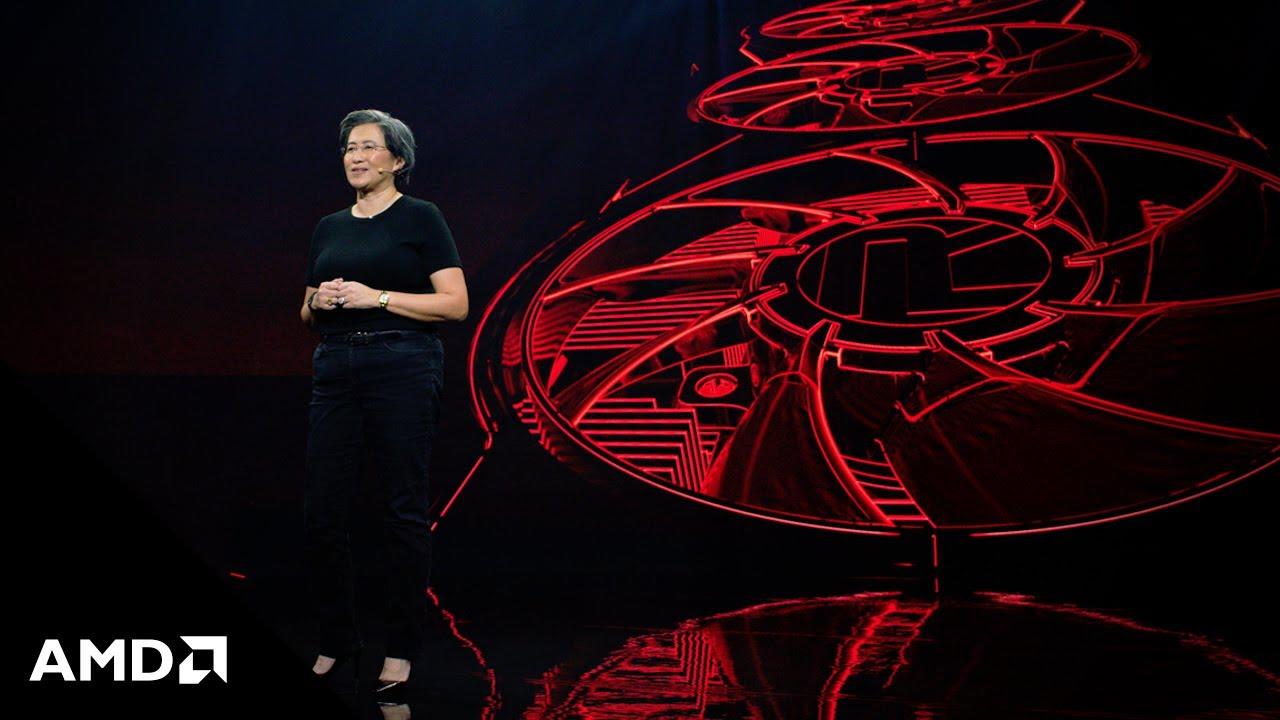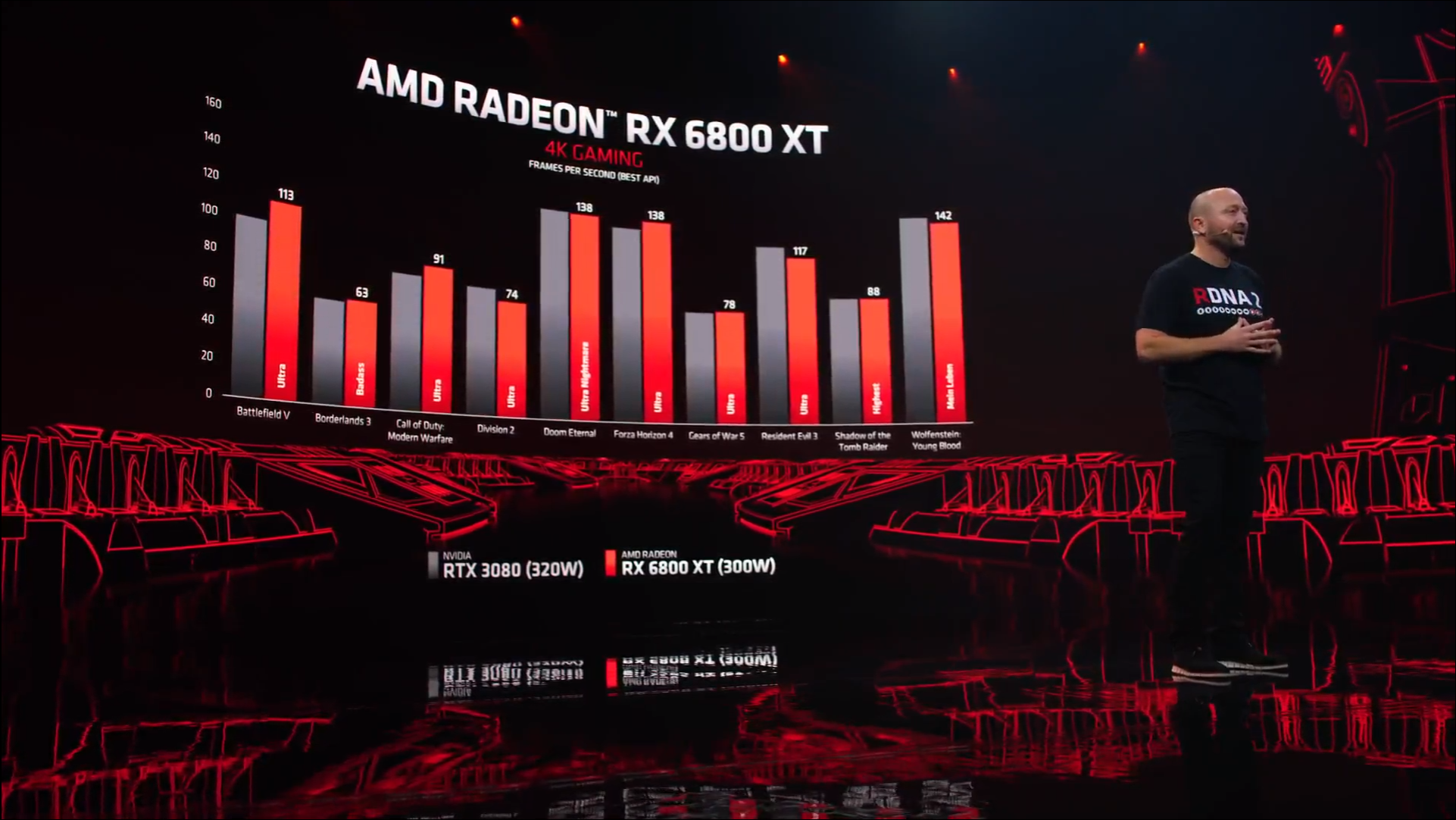Today AMD formally revealed the next-generation Radeon GPUs powered by the RDNA 2 architecture and it looks like they’re going to thoroughly give NVIDIA a run for your money.
What was announced: Radeon RX 6900 XT, Radeon RX 6800 XT, Radeon 6800 with the Radeon RX 6800 XT looking like a very capable GPU that sits right next to NVIDIA's 3080 while seeming to use less power. All three of them will support Ray Tracing as expected with AMD adding a "high performance, fixed-function Ray Accelerator engine to each compute unit". However, we're still waiting on The Khronos Group to formally announce the proper release of the vendor-neutral Ray Tracing extensions for Vulkan which still aren't finished (provisional since March 2020) so for now DirectX RT was all they mentioned.
Part of the big improvement in RDNA 2 comes from what they learned with Zen 3 and their new "Infinity Cache", which is a high-performance, last-level data cache they say "dramatically" reduces latency and power consumption while delivering higher performance than previous designs. You can see some of the benchmarks they showed in the image below:
As always, it's worth waiting on independent benchmarks for the full picture as both AMD and NVIDIA like to cherry-pick what makes them look good of course.
Here's the key highlight specifications:
| RX 6900 XT | RX 6800 XT | RX 6800 | |
|---|---|---|---|
| Compute Units | 80 | 72 | 60 |
| Process | TSMC 7nm | TSMC 7nm | TSMC 7nm |
| Game clock (MHz) | 2,015 | 2,015 | 1,815 |
| Boost clock (MHz) | 2,250 | 2,250 | 2,105 |
| Infinity Cache (MB) | 128 | 128 | 128 |
| Memory | 16GB GDDR6 | 16GB GDDR6 | 16GB GDDR6 |
| TDP (Watt) | 300 | 300 | 250 |
| Price (USD) | $999 | $649 | $579 |
| Available | 08/12/2020 | 18/11/2020 | 18/11/2020 |
You shouldn't need to go buying a new case either, as AMD say they had easy upgrades in mind as they built these new GPUs for "standard chassis" with a length of 267mm and 2x8 standard 8-pin power connectors, and designed to operate with existing enthusiast-class 650W-750W power supplies.
There was a big portion of the event dedicated to DirectX which doesn’t mean much for us, but what we’ve been able to learn from the benchmarks shown is that they’re powerful cards and they appear to fight even NVIDIA’s latest high end consumer GPUs like the GeForce 3080. So not only are AMD leaping over Intel with the Ryzen 5000, they’re also now shutting NVIDIA out in the cold too. Incredible to see how far AMD has surged in the last few years. This is what NVIDIA and Intel have needed, some strong competition.
How will their Linux support be? You're probably looking at around the likes of Ubuntu 21.04 next April (or comparable distro updates) to see reasonable out-of-the-box support, thanks to newer Mesa drivers and an updated Linux Kernel but we will know a lot more once they actually release and can be tested.
As for what’s next? AMD confirmed that RDNA3 is well into the design stage, with a release expected before the end of 2022 for GPUs powered by RDNA3.
You can view the full event video in our YouTube embed below:

Direct Link
Feel free to comment as you watch as if you have JavaScript enabled it won't refresh the page.
Additionally if you missed it, AMD also recently announced (October 27) that they will be acquiring chip designer Xilinx.
The only detail I'm currently interested in though is WHEN THE FECKING rdna1 PRICES WILL GO DOWN
I don't really mind proprietary games, but as a Linux user
I clearly want my computer infrastructure being as open as possible.
Hardware, drivers and libs.
This is where AMD shines, if you're smart enough to value this.
As if AMD's GPU's clearly suck compared to NVIDIA's value-wise.Please consider supporting AMD.
I don't really mind proprietary games, but as a Linux user
I clearly want my computer infrastructure being as open as possible.
Hardware, drivers and libs.
This is where AMD shines, if you're smart enough to value this.
Or just be a conscious customer and evaluate products properly instead of relying on ideologies only.
No they don't, and the diff between them is mostly ideological to begin with. The latter abhors public software model, the former at least partially supports it. So the ideology starts with the vendor in this case, rather than with the consumer.
Every product is different and the ideology is the least important difference between them.
For you. Not for me. The ethos of a company, its ethical stance, and its impact on fostering a cultural shift to open methodologies is the single most important aspect of choosing my hardware. Then it's performance, then it's heat/noise/efficiency. Finally, its price comes into consideration.
It's weird to me that you're commenting on a Linux site and don't understand this, or somewhat buy into it. But I suppose as Linux increases in popularity, there will be more and more people like yourself who don't care about open standards (or least, care as much as others do).
Every product is different and the ideology is the least important difference between them. If you have failed to realize that then you should spend more time trying to understand the metrics we use to evaluate a GPU. Watch some reviews and interact with the community. Learn to carefully choose between PC components.
The review I only see is that Nvidia doesn't follow Linux standards with their drivers. This is not about ideology, is about doing things in the right way so the OS we use improves.
The review I only see is that Nvidia doesn't follow Linux standards with their drivers.
It's worse than that. Nvidia refuse to upstream their driver and they also hinder the reverse engineered Nouveau from working, making it impossible to replace their blob with open alternative.
It's a purely anti-competitive stance and the reason for it is known well too. Nvidia makes billions on datacneter GPU usage, and they charge industrial users more money for features they lock behind the blob. Open drivers will prevent them from dictating how you can use the GPU.
Performance is a little worse just because of those specific models, but yeah - until nVidia opens up and gets their drivers mainlined, it's just AMD and Intel really at this point for me.
At least until more open hardware takes off (you bet I'm waiting for RISC-V desktops like the stuff SiFive is announcing in a couple days). One day we'll get beyond the blob firmware, too.
Announcement Today
Cards released December 10th, only usable through proprietary drivers on Ubuntu LTS
Ubuntu LTS updates kernel, proprietary drivers dont work any more, no fix from AMD
3 months after release, open source drivers work if you build several things from git and manually download firmware
Ubuntu 21.04 is released, but not everything made it in time, if you add a few nightly ppas it is usable but still crashes in things like GIMP
A distro is released that had good support for 6000 series, but it is a distro you hate.
Ubuntu 21.10 is released and finally 6000 series has good support.
My Nvidia experience is normally
Buy Nvidia card on launch day, install proprietary drivers, works great on Ubuntu LTS. If a kernel update breaks Nvidia drivers (I can remember the last time this happened) there is a beta driver out fairly quickly.
Personally, I will keep using my 5700XT until there is a game that comes out that it cant handle at 1440p ultra that I will want to play. If a new game comes out and AMD open source driver support is good, I will buy AMD even if it has lower price/perf.
Cool.
The only detail I'm currently interested in though is WHEN THE FECKING rdna1 PRICES WILL GO DOWN
I just want a reasonably priced Radeon laptop. The Dell G5 looks good but is a hair too expensive. I'm hoping that prices drop some too.
Last edited by Mohandevir on 28 Oct 2020 at 3:28 pm UTC
Funny how AMD drivers are better on Linux than on Windows. They should just do the reverse NVIDIA and put the Mesa stack on Windows, and open-source their Windows driver.
Funny how AMD drivers are better on Linux than on Windows. They should just do the reverse NVIDIA and put the Mesa stack on Windows, and open-source their Windows driver.
Someone was already planning to make radv work on Windows.
Every product is differenthow is one (green) GPU is fundamentally different from another (red) pray enlighten us.
the rest of the post is just not worth of replying to really.
If your number-1 metric is vanity then you're destined to make bad decisions.It depends on what you call a "bad decision." There can be plenty of good technical reasons to choose AMD as well, and keep in mind that not everybody buys higher-end cards.
For what it's worth, if I had to buy some GPU today, I'd clearly buy an RX 5600, and that's not even driver or FOSS-related.
Having the driver in the kernel is both a pro and a cons. With integrated driver modules you are forced to use the latest kernels which can introduce stability issues. If we rely on dkms then we don't need to live on bleeding-edge and we can get the latest drivers immediately but the linux kernel developers don't guarantee any compatibility from new kernels, only for their own driver modules.
From an outsider's perspective this sounds bad.
Not sure what you meant with this as any GPU company can follow DRM interface and deliver your driver through dkms. The problem here is that Nvidia approach completely avoids the guidelines Linux provides for graphic drivers, so if their module gets broken after a kernel update the guilt is a 100% on them.
Aaaand in the grand scheme of things the red ones are just as good pound4pound as the green ones.Every product is differenthow is one (green) GPU is fundamentally different from another (red) pray enlighten us.
the rest of the post is just not worth of replying to really.
I already enumerated them but let's do it again: driver stability, driver updating, price/performance, cooling solutions(performance/noise, heat(affects other components too), OC headroom), performance/watts, generic OC headroom, 3rd-party warranty programs, special features(gsync, freesync, wayland, KMS, RTX, DLSS etc.). You can't make an informed purchase without knowing about these.
The majority of the consumers won't care about the intricacies and obscure technicalities or even a dozen more FPS here and there. NVIDIA currently has the upper hand at hardware ray-tracing? Who cares? Well, about 5% of gamers. See?
What's left is support and the Free Software support in particular, how well it alignes with the rest of the stack and in this department there's a clear winner.
Back to square one I guess.
Or just be a conscious customer and evaluate products properly instead of relying on ideologies only.
So you can't buy Nvidia, only AMD or Intel can be bought if you evaluate products properly, and if you need Navi-like power, only AMD can be bought if you evaluate products properly.
Nvidia are bad products on Linux, they require closed obsolete technology, provide experience that did not evolved since year 2000, are badly supported and become quickly obsolete and lose driver support on short time. If Nvidia asked me to build-up for them a catchword, I would say “Nvidia: bringing you year 2000 experience, faster”.
Also, Nvidia drivers are a pain to deal with. As a game developer for Unvanquished, I can testimony we face kind of bugs we never see with Intel or AMD, we even have to hardcode special workaround for their driver brokenness.
We tested more than 50 GPUs that comes from the past 18 years to today:
https://wiki.unvanquished.net/wiki/GPU_compatibility_matrix
And I can testimony: Nvidia is trash and pain, garbage and suffering.
On the contrary AMD support is stellar, it works really well, performance are awesome, and support is stellar.
The only reason to buy Nvidia today is that if you're constrained to use CUDA, so you're likely victim of a racket. Being forced to use proprietary software is worst than not using any software, it's a kind or racket: a service that is fraudulently offered to solve a problem. Being forced to buy Nvidia hardware to run a software is a racket.















 How to set, change and reset your SteamOS / Steam Deck desktop sudo password
How to set, change and reset your SteamOS / Steam Deck desktop sudo password How to set up Decky Loader on Steam Deck / SteamOS for easy plugins
How to set up Decky Loader on Steam Deck / SteamOS for easy plugins
See more from me